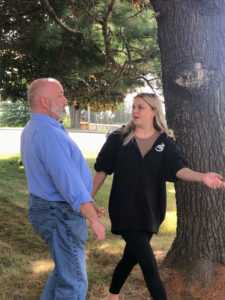Mandt: New Certification $175.00 / Re-certification 102.00
 Mandt is one of the state recognized intervention trainings needed for completion of a MHRT-1 certification. This system provides training in three major areas of intervention, the Relational, the Conceptual and the Technical (RCT). These trainings and the philosophies they instill in workers provides a deeper understanding of how to work with residents, co-workers and management in a way that supports and challenges everyone to be their best selves within the community and home environments. The chapters taught in Mandt can be tailored, within state guidelines, to meet your agencies needs and philosophies and the instructor will work with you to develop a training program specific to the needs and philosophies of your company.
Mandt is one of the state recognized intervention trainings needed for completion of a MHRT-1 certification. This system provides training in three major areas of intervention, the Relational, the Conceptual and the Technical (RCT). These trainings and the philosophies they instill in workers provides a deeper understanding of how to work with residents, co-workers and management in a way that supports and challenges everyone to be their best selves within the community and home environments. The chapters taught in Mandt can be tailored, within state guidelines, to meet your agencies needs and philosophies and the instructor will work with you to develop a training program specific to the needs and philosophies of your company.
Topics covered include:
– Relational: This section makes up the first three chapters of the Mandt system training. It starts with the basis of Healthy Relationship, creating an understanding of why health relationships with residents and the treatment team are not only desirable, but critical to the successful treatment and personal growth of residents and workers alike. It continues to build on these concepts with focuses on healthy communication and strategies for ensuring such communication. Relational training concludes by building an understanding of healthy conflict management, why conflict is not something avoid out of fear, but to be embraced as an opportunity for improving relationships and resolving issues on a permanent basis.
– Conceptual: The second section comprises chapters five through six with a focus on behavior, changing behavior positively and legal expectations around intervention strategies. Chapter four provides an understanding of trauma informed care, the prevalence and impact of trauma on a variety of disabilities and recovery outcomes. Chapter five discusses behavior change methodologies and how to implement them effectively with the support of the Relational skills taught earlier.
Chapter six provides a deeper understanding of caregiver responsibilities and the importance of documentation and the impact it has on residents.
– Technical: The final sections of Mandt provide an understanding of concepts needed for successful intervention on a physical level should a situation be deemed wholly un-safe. Chapter seven provides an understanding of prohibited practices with a focus on why they are prohibited and the fundamentals necessary to provide support to residents that have become ill, injured, or confused. Chapter eight provides additional insights on the reasons why a resident may choose to grab hold of a worker and how to evade and escape such holds, should it become necessary, while also discussing when a worker should not attempt to seek escape. Chapter nine is the final chapter in the Mandt system and rarely taught or utilized as it provides a deep understanding of the inherent dangers related to physical restraint of combative residents and how to implement restraint should the need arise to prevent immediate harm to self or others.
